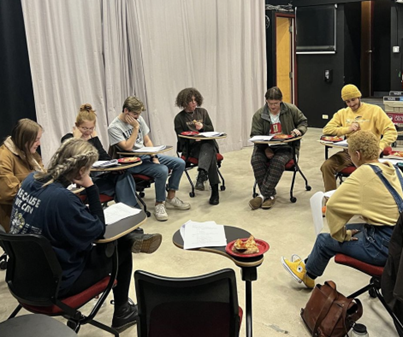The world could use a new Daft Punk album. From conflict abroad to terrorism and governmental turmoil at home, it’s been a rough few months, and there might be no better a time than right now for our favorite French duo to give us a reason to throw on our Friday best and dance the night away. Interestingly enough, Daft Punk’s new record, Random Access Memories, isn’t just an hour-long dance fest—the album relies far more on traditional, live instrumentation than anything the group’s ever released before, and some of its best moments sound more like rock or jazz than dance music. But the grooves are certainly there, the album offers something for everyone, and with an impressive line of guest stars, Random Access Memories feels like the record Daft Punk was put on Earth to make.
When first single “Get Lucky” was unveiled a couple months ago, people went nuts. And why wouldn’t they? The song is ridiculously groovy, features a solid and sexy vocal performance from Pharrell Williams and transports us back to the time when we heard “Harder, Better, Faster, Stronger” for the first time. Interestingly enough, “Get Lucky” is one of the only tracks on the album that really feels like the Daft Punk of yore—only the other Pharrell feature “Lose Yourself to Dance” and opener “Give Life Back to Music” really seem created with a pure dance focus in mind. But they do a great job and are worth throwing on any summer party mix.
It’s where Daft Punk’s ambitions reach further than the dance floor, however, that some of the most impressive moments on the record emerge. “Giorgio by Moroder,” for example, starts off with an interesting spoken-word discussion on the French electronic music scene, and eventually transitions into a mind-blowing jam-out session that you never would have expected from the duo. Late-album track “Motherboard” has a similarly dynamic vibe, and would likewise appeal to rock as well as longterm Daft Punk fans.
The collaborative tracks are also generally a pleasure, and Daft Punk has done a great job amassing a reasonably star-studded but still tasteful list of guest stars for the record. The aforementioned Pharrell tracks go off without a hitch, but the best two guest appearances might be “Instant Crush” (featuring The Strokes’ Julian Casablancas) and “Doin’ It Right” (which features Animal Collective’s Panda Bear). Both of these songs feature clever and passionate vocal performances that mesh extremely well with Daft Punk’s instrumentals, and will absolutely stay in your head after the dust of your first spin has settled.
The sheer ambition of Random Access Memories also deserves note. At 74 minutes long, the album barely fits onto a standard CD, and the collection of genres and ideas Daft Punk has thrown in is impressive. ‘70s rock, electronic dance music, hints of jazz, pop and indie rock can all be found, and Daft Punk is surprisingly adept at wielding these new styles (the talented lineup of guest instrumentalists certainly helps as well). At its best, Random Access Memories feels like a true modern pop epic, and Daft Punk has its eyes set on nothing less than the stars—the final track, “Contact,” samples an audio recording of Eugene Cernan, the last man to have gone to the moon, talking about an unknown object he sees in space. The track is masterfully executed and unabashedly dramatic, and perfectly represents the best Daft Punk has to offer on the album.
However, this impressive scale also brings with it the occasional bad idea, and when these moments start adding up, the record can feel like it drags a bit. When Daft Punk drops the tempo, as it does on “The Game of Love,” “Within” and “Beyond,” the results are less than captivating. And regrettably, the biggest misfire is also one of the longest—the eight-minute centerpiece “Touch” (featuring the venerable Paul Williams) is a bloated and melodramatic love song that sounds like it belongs on Broadway rather than a Daft Punk album. You’ll appreciate the idea, but not the execution.
With these in mind, you might walk away from Random Access Memories feeling like it’s somewhat bloated, and you wouldn’t necessarily be wrong. But for every weak moment, there are 10 that’ll blow you away, and Daft Punk deserves a lot of credit for throwing away its rulebook and making something totally fresh. And, as Giorgio Moroder says in his monologue: “Once you free your mind about a concept of harmony and music being correct, you can do whatever you want.” On Random Access Memories, Daft Punk sounds free to make the music it wants to make, and in doing so, has given us everything we could have ever asked for.











